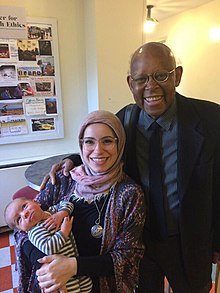Black theology
Appearance


Black theology, or black liberation theology, refers to a theological perspective which originated among African-American seminarians and scholars, and in some black churches in the United States and later in other parts of the world. It contextualizes Christianity in an attempt to help those of African descent overcome oppression.
| This Christianity-related article is a stub. You can help out with Wikiquote by expanding it! |
Quotes
[edit]- Black men must ask themselves a difficult question. How can a white society characterized by Black enslavement, colonialism, and imperialism provide the normative conception of women for Black society? How can the sphere of the woman, as defined by white men, be free from the evils and oppressions that are found in the white society? The important point is that in matters relative to the relationship between the sexes, Black men have accepted without question the patriarchal structures of the white society as normative for the Black community. How can a Black minister preach in a way that advocates St. Paul’s dictum concerning women while ignoring or repudiating his dictum concerning slaves? Many Black women are enraged as they listen to “liberated” Black men speak about the “place of women” in words and phrases similar to those of the very white oppressors they condemn.
- Jacquelyn Grant, "Black Theology and the Black Woman," in Words of Fire: An Anthology of African-American Feminist Thought (1995), p. 323
- If the church ... does not make God's liberation of the oppressed central in its mission and proclamation, how can it rest easy with a condemned criminal as the dominant symbol of its message?
- James H. Cone, Speaking the Truth: Ecumenism, Liberation, and Black Theology (1986), p. 6
- By becoming poor and entrusting divine revelation to a carpenter from Nazareth, God makes clear where one has to be in order to hear the divine word and experience divine presence.
- James H. Cone, Speaking the Truth: Ecumenism, Liberation, and Black Theology (1986), p. 9

